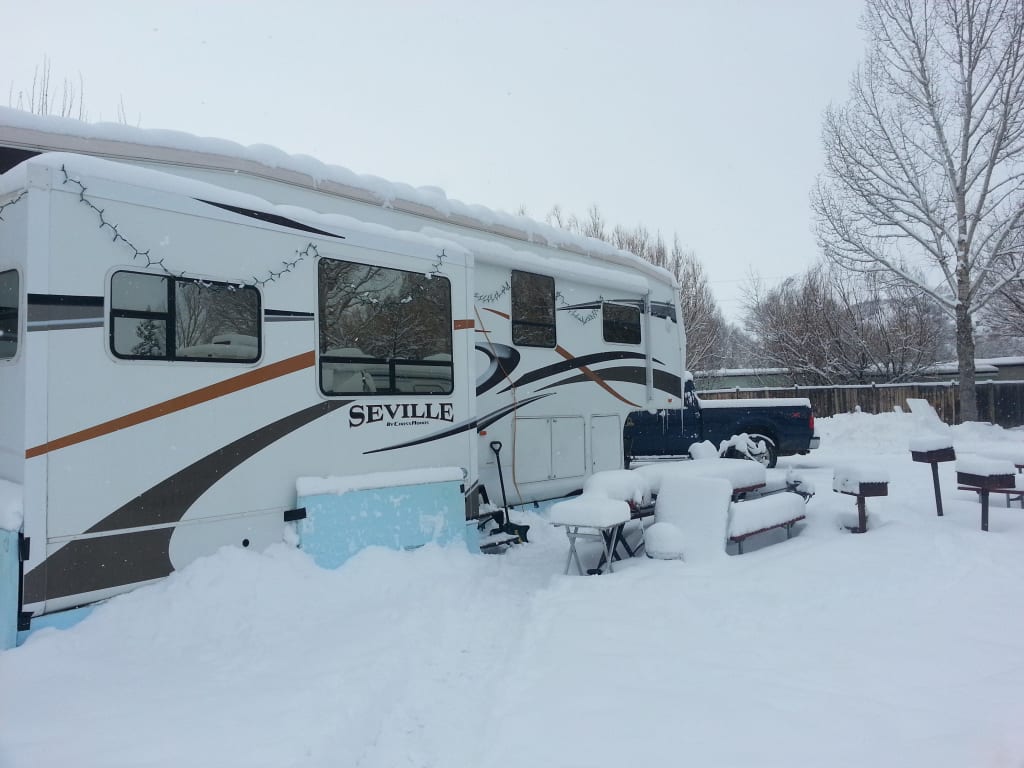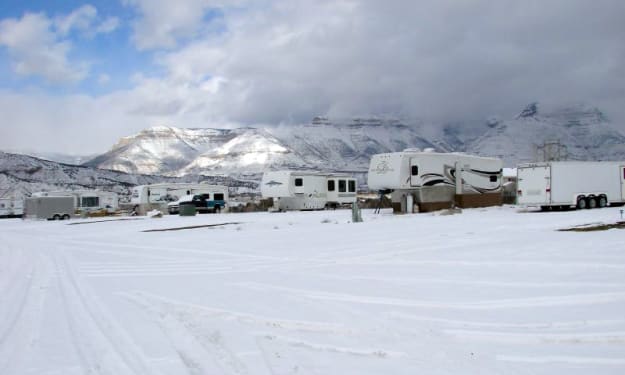Winter Living in an RV
Surviving a Winter in a Small Camper

Living in a recreational vehicle or camper during the cold winter months poses unique challenges for even the most experienced outdoor hobbyist. Keeping warm and living comfortably isn't as easy as turning on the furnace and heating up the inside living spaces.
Recreational vehicles (RVs) can be quite comfortable, but even the best designed units have paper thin walls and minimal insulation against the cold winter temperatures. Every time the door opens all the heat will escape, leaving a brisk chill in the air.
I spent one winter living in a RV and learned many lessons the hard way. Here are a few suggestions I learned through trial and error:
Towel Over Door
Hang a thick bath towel over the main door leading out of the RV. This towel will reduce the heat loss when the door opens.
Insulate Windows
No RV has good insulation, so it is imperative that all windows are insulated with either StyroFoam or clear plastic window sheets, or both. Either of these added steps will dramatically reduce the drafts that will come through those openings.
Space Heaters
Small electric space heaters are an excellent way to conserve propane burn and provide added warmth to the areas occupied during the day and evening. Be careful to purchase only brand-name, heavy duty space heaters with undamaged electrical cords. Adding a small space heater to the lavatory will help keep the black tank from freezing and is a nice addition for people coming out of the shower.
Frozen Tanks
Keeping your water and waste tanks from freezing is an especially difficult task. If there is a winterizing skirting around your RV, it may be helpful to install a small heavy duty space heater under your unit to keep the gray and black tanks from freezing. The fresh water tank should be alright with daily use, although the water supply feeding the tank can (and will) freeze. Special heat tape and hose insulators are available for purchase at any hardware store, but these are ineffective in prolonged sub-freezing temperatures.
To help keep the black water tank from freezing, add a half gallon of windshield cleaner to the tank when it is emptied. The windshield cleaner will keep the fluids from freezing and make purging the tank easier. Don't forget to refill the windshield cleaner in the tank after each dump.
Propane Tanks
It is imperative to keep one tank full at all times. When selecting which tank is being used, select the option that restricts gas draw to only one tank at a time. This guarantees a full tank is available when the tank in use runs empty. Switch to the full tank, remove the empty and promptly get it refilled. I always kept a small five gallon propane tank in reserve just in case the winter weather prohibited me from getting to a local refill station.
Furnace
The RV furnace is designed to keep the interior warm even under the most frigid conditions. However, the longer the furnace runs, the faster the propane burn. I always lowered the furnace temperature or turned it off when I was cooking, as the heat from the stove more than sufficiently heated the entire RV. At night, I lowered the furnace to 55 degrees and used electric heating blankets. On less cold nights, I used electric space heaters to supplement and conserve of propane burn. Never set the thermostat lower than 55 degrees during cold months. Temperatures below this could cause internal water pipes and tanks to freeze or crack.
Electric Blankets
Obviously, electric blankets on your bed make for more comfortable sleeping conditions during the cold winter nights. I discovered another great use for electric blankets by accident. I draped one over the sofa and left it on a low setting. Even when I wasn't on the sofa, I left the blanket on. The temperature radiates into the air, adding wonderful warm heat to the RV. My sofa was built in to an extending unit on the RV, so it was a very drafty area to sit on cold winter nights. The heating blanket worked wonders for keeping me warm.
I often kept a three-wick candle burning on the dining table during evening hours. I'm not sure if the fire actually helped add heat to the RV or if I just imagined it, but it seemed to make a difference. Whether it worked or not, it added a nice ambiance to my winter home. Just be careful to never leave a burning candle unattended.
It's also imperative that all the exterior corners are carefully checked and tuck-pointed whenever even the smallest crack is visible. Those small cracks will let in the cold winter air and defeat all your other winterizing preparations.
Living in a RV or camper during the winter months poses its own challenges, but it can be an fun, exciting experience as well. Take a few moments to winterize ahead of time to guarantee you'll live safe and comfortable during your wintertime adventure.
About the Creator
Dan McGinnis
Freelance writer, screenwriter, author






Comments
There are no comments for this story
Be the first to respond and start the conversation.